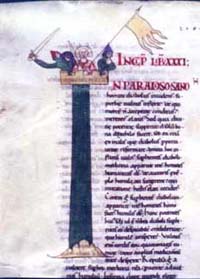 |
 |
 |
 |
 |
 |
 |
|
The fall (2/2)
The mid-thirteenth century heralded a period of general decline: the abbey suffered financial strain; numbers were badly hit by the Black Death and never fully recovered. There were also disciplinary problems, and in 1361 the community was accused of a string of abuses that included laying violent hands on their own brethren (and others), carrying arms and playing dice. Moreover, the administration of the abbey’s fragmented estates now grew increasingly complex, and the abbot, as the head and representative of the community, was more extensively involved in external affairs. Litigation increased, and whilst this was mostly concerned with land disputes, other matters were brought to the courts; these could be costly and time-consuming. Anabilia, a recluse from Doncaster, sued Abbot Stephen (c.1286-1300) for withdrawing her weekly corrody of five monastery loaves and three gallons of monastery ale, which, she claimed, had been granted for life by Abbot Walter (1254-68). The case was in the courts from 1289-93.(3) Business relating to the Order could be onerous, and even dangerous. In accordance with Cistercian legislation the abbots of Roche acted as arbiters in clashes between neighbouring Cistercians. This involved them in some perilous situations. Abbot Robert of Kesburgh’s experience at Meaux at the turn of the fifteenth century was particularly hazardous. The General Chapter sent the abbots of Roche and Furness to investigate complaints that the election of Abbot Thomas Burton, in 1396, had been imposed upon the monks of Meaux. Upon his arrival at the abbey Robert was refused entry. The gates were closed, and a group of men armed with bows, arrows and other warlike weapons were posed to keep him out. Robert, prudently, withdrew, but the matter was later resolved through arbitration in favour of Abbot Thomas of Meaux. From the mid-thirteenth century the abbots of Roche were not only weighed down by business relating to the house and Order, but were thrust to the forefront of political affairs. In December 1264 Abbot Walter and over one hundred other prelates were summoned to attend Simon de Montfort’s parliament that was held in London, 28 January, 1265. This was a momentous occasion, for hitherto only eleven prelates and twenty-three magnates had attended. (4) Moreover, it changed the nature of the abbot’s role, for he was now considered a political figure and expected to lend counsel and aid in these turbulent times. War against France and the threat of a Scots’ invasion meant that his presence was frequently demanded throughout the thirteenth and fourteenth centuries. Indeed, in 1313 Abbot Robert was summoned to parliament on three occasions. It was, therefore, a changed and changing world; the abbot of Roche was not simply the Father of a secluded community, but drawn into administration, litigation and political affairs. He was bound by loyalties to the abbey, the Order and the king, and there could be a conflict of interests. Abbot William (c.1324-30) and twelve other Northern abbots were prohibited from attending the Annual General Chapter at Cîteaux in 1327, when it was feared that the Scots would take advantage of the weak government. The abbots were instructed to remain at home and guard the area. Furthermore, Roche was no longer a safe haven, secluded and sheltered from external conflict. In 1322 the valley of Roche was ravaged by rebels, when John of Mowbray and other supporters of the earl of Lancaster besieged Tickhill Castle, situated a few miles from the abbey. This placed the abbot in a tricky position and demanded diplomacy, for whilst he received a royal mandate to muster troops to resist these rebels, he did not want to provoke them to attack the abbey. The situation was resolved on 2 March 1322, with the defeat of the rebels at Boroughbridge. |
||
|
